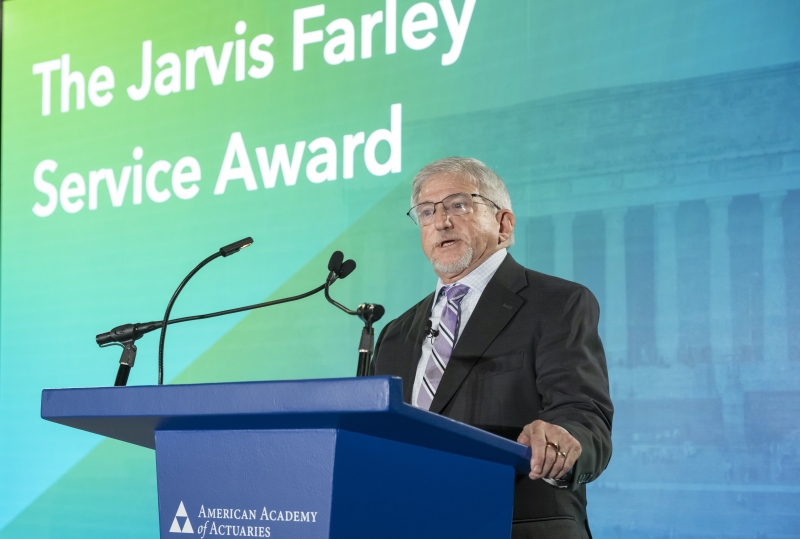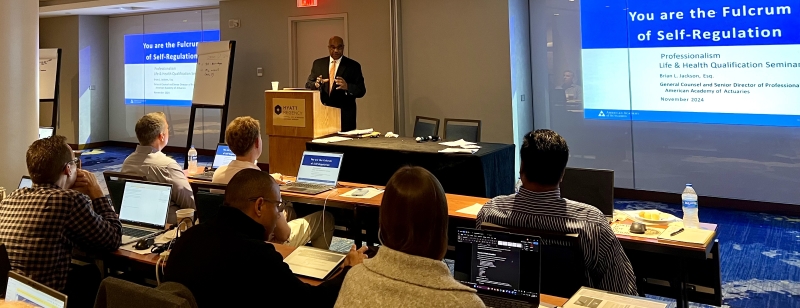HealthCheck, Fall 2024
VOL 15 | NO 3
Date:11/01/2024
Envision Tomorrow
Session Looks at Broadening the Focus on Health Outcomes
Panelists Address Disparities, Health Equity Issues

Session presenters (L–R) Sheppard, Gandotra, Hendricks-Sturrup, Singleton, and Thompson
An Envision Tomorrow health breakout session, moderated by Health Equity Committee Co-Chairperson Becky Sheppard, focused on how adding or enhancing benefits—along with other indirect costs and nonfinancial considerations—may impact health spending and outcomes from a health equity perspective.
Panelists used mental and behavioral health as an example, examining the latest data on mental health and substance abuse, discussing integrated care, and providing examples of incorporating indirect cost/savings and non-financial outcomes into actuarial analysis.
“An overarching theme is moving away from our silos,” Sheppard said following the session, which includes “broadening our focus either in terms of our expertise/practice area or of how we look at our work—for example, splitting up behavioral and physical health.”
Senior Health Fellow Cori Uccello added that presenters looked at “shifting to integrated care that focuses on the whole person, which can both improve health outcomes and use our health dollars more effectively, even saving money.”
Presenters were Neeraj Gandotra, chief medical officer (CMO) with the Substance Abuse and Mental Health Services Administration (SAMHSA); Rachele Hendricks-Sturrup, research director at Duke-Margolis Institute for Health Policy; Christa-Marie Singleton, CMO, U.S. Office of Personnel Management; and Mike Thompson, former chairperson of the Health Practice Council’s (HPC) Medicare Subcommittee.
They discussed health disparities, health equity, and finding new ways for actuaries to address costs that can affect health outcomes, said Annette James, Academy incoming health vice president and the outgoing co-chairperson of the Health Equity Committee, following the session.
“The one thing that I hope everyone took away is the need to collaborate with others—not just actuaries, but people we don’t usually collaborate with,” she said, including health researchers, clinicians, and policy experts, who were represented on the panel.
“In order to truly understand health disparities, and eliminate them, we have to be able to reach outside of ourselves and learn more about others’ perspectives and how they can be incorporated into our work,” James said.
“Actuaries have been taught that we need to be the experts on everything and know the answers, but we don’t know all the answers,” she said—so reaching out to others can help with that.
James said the session was a “launching pad” for some of the HPC’s upcoming work and events on health equity, behavioral health, and cost issues—including webinars and an in-person symposium next year.
Learn more about the Health Equity Committee’s work on the Academy’s Health Equity webpage.
Sessions Cover Medicare/Medicaid, ACA Issues
Other Envision Tomorrow health breakout sessions included “Integration of Care for Dual-Eligible Beneficiaries Across Medicare and Medicaid,” and “Regulating the ACA: What’s New for 2025?” Both sessions featured panelists from the federal government, who offered insight into these issues and highlighted recent Administration actions. For a recap, see the Envision Tomorrow supplement to the October Actuarial Update.
Past Health VP Al Bingham Receives Farley Award

Bingham
Also at Envision Tomorrow, Al Bingham, a past Academy vice president of both health and professionalism, received the Jarvis Farley Service Award—a lifetime achievement award that honors a member whose volunteer efforts on behalf of the Academy have made significant contributions to the advancement of the profession.
Bingham has served in more than 35 Academy service roles. As health vice president, he led the Academy’s objective actuarial input during passage of the Affordable Care Act (ACA). As professionalism vice president, he helped strengthen standards that guide the profession’s work.
Referencing the extensive work at the time of the ACA’s passage—for which he thanked Academy Senior Fellow Cori Uccello in particular—Bingham said that “Academy input, comments, and recommendations provided critical expertise from our profession that addressed problems and improved what became the final version of that legislation. And the Academy continues to provide that critical expertise on a wide range of policy issues today, in health and other practice areas.” He added that “the work we do—that you do—in the Academy, on projects large and small, matters.”
Academy Holds Successful LHQ Seminar
 Academy Senior Director of Professionalism Brian Jackson presents at LHQ
Academy Senior Director of Professionalism Brian Jackson presents at LHQ
The Academy held the 2024 Life and Health Qualifications Seminar Nov. 4–7 in Arlington, Va. The annual LHQ Seminar for life and health actuaries offers basic education or relevant continuing education (CE) necessary to qualify to issue statements of actuarial opinion (SAOs) for NAIC annual statements.
“One of the things we stress in the seminar is staying nimble—especially on the health insurance side, because things can change quickly—in addressing changes that regulatory and political change can create,” David Dillon, an LHQ Seminar presenter and a member of the Individual and Small Group Markets Committee, said in a brief interview at the seminar.
There are also such issues as “student insurance, short-term health, and hospital indemnity, which are sometimes treated as tangentially related to the ACA, and so there’s political changes to those products as well,” he said.
Issue Brief, Infographic Cover 2025 Premium Drivers
The Individual and Small Group Markets Committee released an issue brief, Drivers of 2025 Health Insurance Premium Changes, which provides discussion on the factors that are likely to drive health insurance premium changes in 2025 for plans operating in the individual and small group markets subject to Affordable Care Act (ACA) rules. An accompanying infographic breaks down the factors in easy-to-understand language.
“Pressures on ACA-market premiums are relatively mild compared to some previous years, but there is some upward pressure from higher prescription costs and, to a lesser degree, inflation,” said Senior Health Fellow Cori Uccello. “Changes in risk pools are not seen as likely to have a major effect on next year’s premiums overall, though it’s always important to keep in mind that individual insurers may be affected by specific factors, trends, and developments in their state or regional markets.” Read the news release.
Issue Brief Examines ERISA in the Context of Health Benefits
The Health Practice Council released an issue brief, ERISA at 50: ERISA and Health Benefits, which covers the history of ERISA’s application to health benefits, subsequent amendments to the law, ERISA’s facilitation of coverage for employer-sponsored health plans, and its benefits and challenges. Also released—an executive summary.
Health Webinar Examines 2025 Premium Drivers
Individual and Small Group Markets Committee members presented in a July 18 webinar, Drivers of 2025 Health Insurance Premium Changes. Chairperson Jason Karcher led the discussion, which looked at factors influencing the pricing of health insurance premiums next year, including the resumption of Medicaid eligibility. A recording is available via Academy Learning.
Webinar Looks at Medicaid, Managed Care
A health webinar, Overview of CMS’ Final Rules for Ensuring Access to Medicaid Services, and Managed Care Access, Finance, and Quality, examined two recently released Centers for Medicare & Medicaid Services (CMS) final rules on Medicaid and managed care access. A recording is available via Academy Learning.
Outreach
Public Policy Outreach: Uccello Presents on Medicare
Senior Health Fellow Cori Uccello presented virtually on “The Medicare Program—Challenges and Opportunities” to the Humana Virtual Continuing Education Summit, giving an overview of Medicare’s financial status; Medicare Advantage payment basics; the Medicare Payment Advisory Commission’s findings and recommendations; recent legislative and regulatory developments; and potential policy actions.
Reappointment to CBO Panel
Uccello also was reappointed to the U.S. Congressional Budget Office’s (CBO) Panel of Health Advisers for the coming year. With the insights and expertise of advisers like Uccello, the CBO is better positioned to offer Congress nonpartisan, objective support in the federal budget process.
GAO Panel Participation
Uccello also participated in a U.S. Government Accountability Office (GAO) Comptroller General’s Forum on U.S. health care spending. The forum was convened to advance the national dialogue around issues of cost, access, and quality challenges.
Academy, HPC to Present at NAIC Fall Meeting
 Academy volunteers will be presenting at this month’s NAIC Fall National Meeting in Denver. Senior Health Policy Analyst Matthew Williams will present on Health Practice Council activity to the NAIC’s Health Actuarial (B) Task Force (HATF), including a preview of the Life and Health Valuation Law Manual. (Look for preorders to open soon.)
Academy volunteers will be presenting at this month’s NAIC Fall National Meeting in Denver. Senior Health Policy Analyst Matthew Williams will present on Health Practice Council activity to the NAIC’s Health Actuarial (B) Task Force (HATF), including a preview of the Life and Health Valuation Law Manual. (Look for preorders to open soon.)
The Academy will also give professionalism presentations to HATF and other practice-area task forces featuring President-Elect Darrell Knapp, Past President Shawna Ackerman, and Actuarial Standards Board Chairperson Kevin Dyke. Knapp will also speak during the HATF meeting on the Academy’s drafted health appointed actuary knowledge statements. The Task Force had exposed the drafted language for public comment in October and the Academy is looking to submit a final version of the statements to the NAIC by the end of the year.
NAIC Summer Meeting—Catch a recap of the Academy’s and HPC’s presentations at the NAIC Summer National Meeting in Chicago on the Academy’s YouTube channel.
The Active Benefits Committee and the Individual and Small Group Markets Committee sent a letter responding to the U.S. Senate Committee on Health, Education, Labor & Pensions’ (HELP) request for information regarding portable benefits for self-employed workers and other individuals in nontraditional working arrangements.
The Long-Term Care (LTC) Committee submitted comments to the NAIC’s LTC Actuarial (B) Working Group in response to the group’s request for comments on the Minnesota approach.
Highlights From HealthCheck

Prefer to watch your news? Check out this “Highlights From HealthCheck” video for a quick recap of what you need to know.
Webinar to Focus on Ethics in Health

A Nov. 12 webinar, Ethical Dilemmas Facing Health Actuaries: Insights and Case Studies, will feature Academy professionalism leaders from the health practice area who will discuss potentially challenging ethical situations that health actuaries may face in their work. Presenters include President-Elect Darrell Knapp; Rob Damler, an ASB past chairperson; and Audrey Halvorson, a past Academy health vice president.
Presenters will discuss case studies including issues of confidentiality, third-party responsibility, qualifications, Medicare Advantage upcoding, and pressure from principals. Academy General Counsel and Senior Director of Professionalism Brian Jackson will moderate.
The webinar will be held from noon to 1:15 p.m. EST on Nov. 12. Register today.
Fierce Healthcare and The American Journal of Managed Care covered the Academy’s issue brief on 2025 health insurance premium drivers. The U.S. Chamber of Commerce also drew from the issue brief to help explain health insurance trends.
Senior Health Fellow Cori Uccello co-authored the story, “The Opportunity Costs of Medicare Advantage Plan Rebates,” published by the New England Journal of Medicine. It examines the costs of Medicare Advantage rebates for beneficiaries and explores alternatives that could improve beneficiary outcomes and the program’s finances.
Uccello was also quoted in a Verywell Healthstory about 2025 health premiums, which was reprinted by MSN and AOL.
Barron’s quoted Long-Term Care Committee member Laurel Kastrup on LTC insurance issues.
Legislative/Regulatory Activity
Federal – Regulatory
The Biden administration announced it expects to save $1.5 billion in out-of-pocket costs for senior citizens in 2026 when the first year of the 2022 Inflation Reduction Act’s Medicare prescription drug negotiations takes effect. Challenges to the law continue to wind through the federal court system.
Fiscal year 2025 Medicare payments for inpatient care at acute-care hospitals will increase 2.9%, or roughly $2.9 billion, per an Aug. 1 final rule from the Centers for Medicare & Medicaid Services (CMS). The rule also increases the standard Medicare payment rate to long-term care hospitals by 2%, or $45 million, for inpatient care.
CMS issued a final rule revising the Medicare Prescription Drug Benefit (Part D) and the Office of the National Coordinator for Health Information Technology regulations implementing changes related to the required standards for electronic prescribing and adoption of health information technology standards for the Department of Health and Human Services Department (HHS) use.
A federal appeals court largely preserved a provision related to free preventive services provision of the Affordable Care Act. The U.S. Court of Appeals for the 5th Circuit granted relief from the mandate to the small group of Christian-owned companies that brought the challenge.
Health care providers that block the exchange of health care data could be subject to reduced Medicare payments under a June 24 rule finalized by HHS. The finalized “info blocking rule” stems from a 2016 medical research law and imposes financial penalties on providers that block patients and other providers from accessing relevant health information.
The U.S. Court of Appeals for the 5th Circuit upheld a lower court ruling related to regulations implementing the dispute-resolution process of the No Surprises Act. Providers challenged rules from the Departments of HHS, Labor, and Treasury. The appellate court agreed with a lower court’s finding that the Departments’ arbitration method favored payers, which was not consistent with the provisions of the law.
Federal – Legislative
The House Education and Workforce Committee approved HR 9457 on Sept. 11, barring group health plan or group health insurance coverage from charging more for telehealth services than they would for an in-person visit.
The Senate unanimously passed S 150, the Affordable Prescriptions for Patients Act, which seeks to curb anticompetitive practices in the drug market. The bill addresses a pharmaceutical company tactic to extend a monopoly on a brand-name drug by slightly altering it just before a generic version becomes available.
The House Appropriations Committee approved HR 9029, which outlines discretionary spending for the departments of Labor, Education, and HHS in fiscal year 2025. The bill proposes $107 billion in discretionary spending for HHS, which is a decrease of $8.5 billion compared to the 2024 fiscal budget.
The Senate Health, Education, Labor and Pensions (HELP) Committee advanced legislation reauthorizing a decades-old law aimed at providing support to adults as they age in their communities. S 4776 reauthorizes the Older Americans Act through 2029, aiming to protect older Americans from abuse, neglect, and exploitation through the long-term care ombudsman program. The HELP Committee approved bills to reauthorize programs for autism research (S 4762) and programs to support people who have experienced traumatic brain injuries (S 4755).
The Senate passed S 4351, reauthorizing the funding for poison control centers for five years.
State – Legislative
Illinois Gov. JB Pritzker signed several health-related bills into law, including:
- HB 5239, prohibiting the state from expending any money or resources to assist in an interstate investigation seeking to impose civil or criminal liability on a person inquiring about reproductive health care services in Illinois or assisting a person inquiring about or receiving such services.
- SB 3130, allowing those who are pregnant to enroll in a qualified health plan via a special enrollment program once a doctor verifies the pregnancy. It will take effect when the state-based exchange goes live in 2026.
- HB 5142, requiring health insurers to cover all pregnancy, postpartum, and newborn care services provided by perinatal doulas or licensed midwives, including home births, home visits, support during labor, miscarriages, or abortions.
- HB 4055, barring health insurers from requiring prior authorization or approval for emergency services, as well as prior authorization for drug therapies approved by the U.S. Food and Drug Administration, for hereditary bleeding disorders.
- HB 5493, prohibiting health insurers from requiring prior authorization or referral by a plan or primary care provider for any member seeking coverage for certain obstetrical or gynecological care.
Massachusetts Gov. Maura Healey signed H 5033, reforming the long-term care industry by strengthening regulations, requiring infection outbreak response plans, and addressing staffing issues with a career ladder and grant program.
New Hampshire Gov. Chris Sununu signed SB 177, requiring health insurers to provide insurance coverage for prosthetic devices, including activity-specific devices, for children under 19 years of age.
Hawaii Gov. Josh Green signed HB 2393, requiring health insurers to cover mandated mammography services at least as favorably as it does for other radiological examinations.
New York Gov. Kathy Hochul signed S 8144/A 8834 , prohibiting health insurers from discrimination against people who were prescribed pre-exposure prophylaxis medication for HIV prevention.
Florida Gov. Ron DeSantis signed HB 885, requiring the state to cover biomarker testing for specified purposes in health plans offered to state employees. It also requires the state to pay for biomarker testing as part of Medicaid under certain instances and requires managed care plans under contract with the state as part of the Medicaid program to do the same.
Rhode Island Gov. Dan McKee signed HB 7091/SB 2382, repealing the authority of the health insurance commissioner to enforce any act of Congress or decision of a federal court invalidating or repealing the prohibition of annual lifetime limits on health insurance in the state.